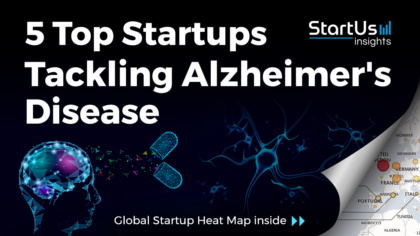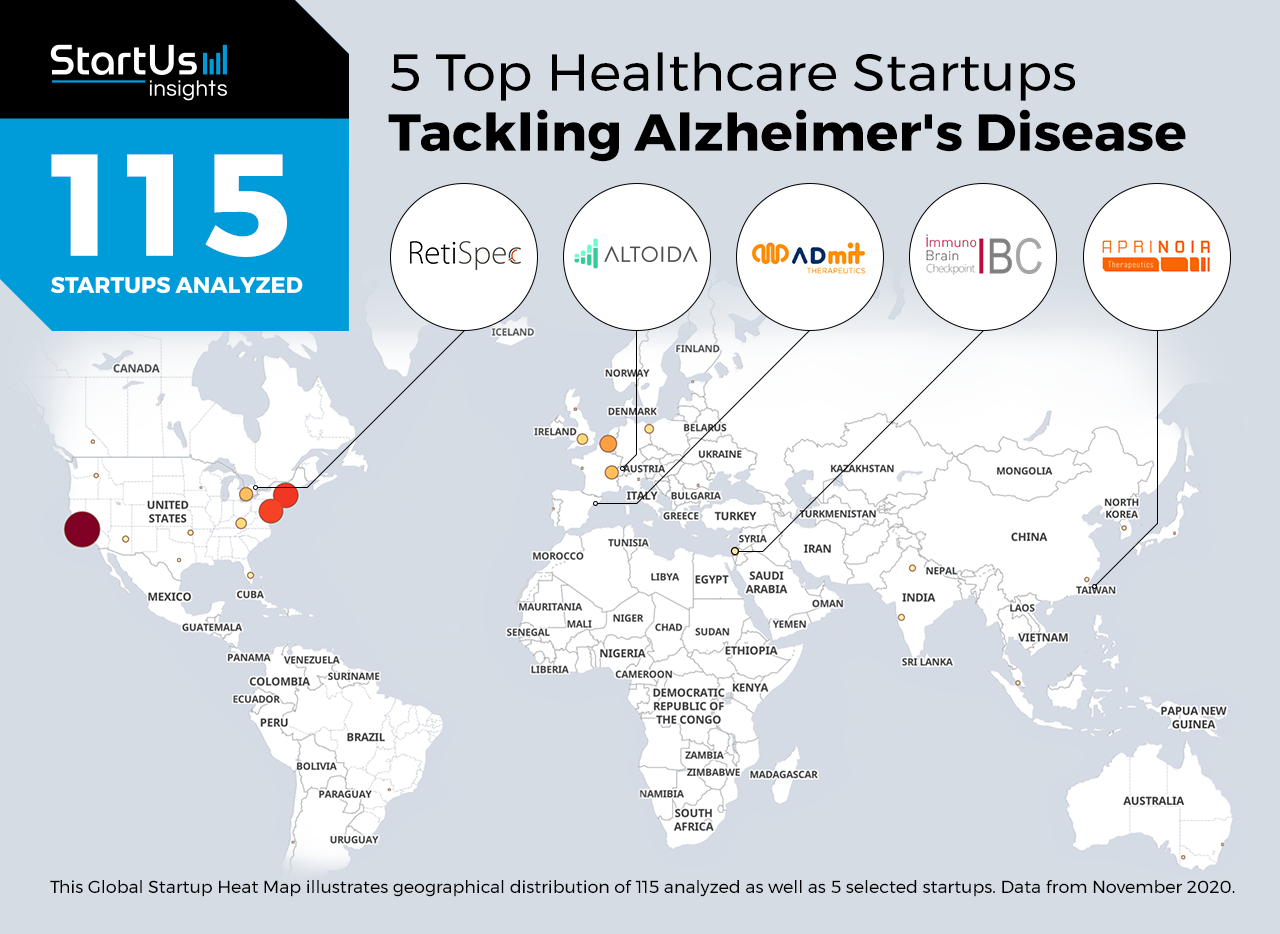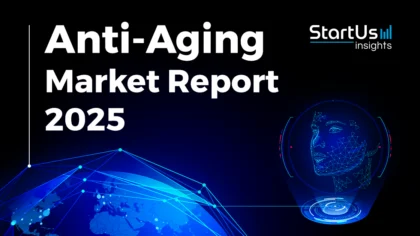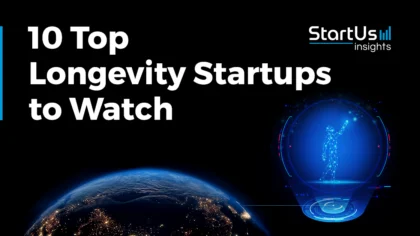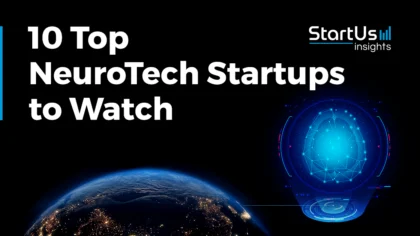Accelerate Productivity in 2025
Reignite Growth Despite the Global Slowdown
Staying ahead of the technology curve means strengthening your competitive advantage. That is why we give you data-driven innovation insights into the healthcare industry. This time, you get to discover 5 hand-picked startups tackling Alzheimer’s disease.
Global Startup Heat Map: 5 Top Startups Tackling Alzheimer’s disease
The 5 healthcare startups you will explore below are chosen based on our data-driven startup scouting approach, taking into account factors such as location, founding year, and relevance of technology, among others. This analysis is based on the Big Data & Artificial Intelligence (AI)-powered StartUs Insights Discovery Platform, covering over 1.3 million startups & scaleups globally.
The Global Startup Heat Map below highlights the 5 healthcare startups & scaleups our Innovation Researchers curated for this report. Moreover, you get insights into regions that observe a high startup activity and the global geographic distribution of the 115 companies we analyzed for this specific topic.
RetiSpec – Retinal Imaging Diagnostics
Alzheimer’s disease is a progressive neurodegenerative disease that destroys memories and other critical mental functions. One of the biggest challenges concerning Alzheimer’s disease is the detection of its symptoms. However, medical imaging startups develop diagnostic imaging solutions that enable doctors to detect the biomarkers for Alzheimer’s disease earlier in the patient’s lifetime.
Canadian startup RetiSpec develops a tool for the early detection of Alzheimer’s disease biomarkers in the eye. The startup’s patented technology leverages machine learning and hyperspectral imaging to identify specific biomarkers in the retina. This solution is rapid, low-cost, and also simple by design enabling medical professionals to identify signs of Alzheimer’s early on.
ADmit Therapeutics – Epigenetic Diagnostics
While many drug development companies focus on reducing the beta-amyloid buildup in the treatment of Alzheimer’s disease, clinical trial results do not reciprocate the effort in this avenue. Because of this, drug discovery startups focus on other factors such as tau protein tangles, immune function, and even vascular health, which all contribute to the progression of Alzheimer’s disease.
Spanish startup ADmit Therapeutics develops a diagnostic test and corresponding in vivo diagnostic device (release in 2023) to identify biomarkers not related to beta-amyloid or tau. Instead, the startup’s test is based on epigenetic diagnostics. A simple blood sample covers the analysis of a large number of methyl-cytosines in mtDNA through next-gen sequencing. Because systemic mitochondrial dysfunction appears just before cerebral abnormalities, the test is an indicator for early-onset AD.
APRINOIA Therapeutics – Neurofibrillary Tangles (NFTs) Diagnostics
NFTs directly impact the progression of Alzheimer’s disease. Studies relating to the reasons behind AD progression indicate that the loss of NFT-affected neurons directly results in the disconnection of critical neural circuits in the brain. As a result, this increases the speed at which AD progresses and contributes to the defects in memory and higher-order cognitive functions in patients. Startups develop diagnostic solutions to monitor the affected neurons and amyloid buildup in the brains of patients suffering from AD.
Taiwanese startup APRINOIA Therapeutics develops image-based diagnostic tools to identify NFTs that indicate Alzheimer’s disease and other neurodegenerative diseases. The startup’s PET imaging tracers enable clinicians to track and monitor the progression of AD and tauopathies. This allows for an early diagnosis and treatment in comparison to diagnosing Alzheimer’s in later stages.
Altoida – Augmented Reality (AR) for Cognitive Monitoring
Typically, people seek a diagnosis of Alzheimer’s disease only after a major episode. However, by that time it is often too late to slow down the progression of the disease. Augmented reality (AR) and virtual reality (VR) technologies have been shown to comprehensively improve cognitive function in humans. Patients leverage these technologies to continuously exercise their brain and slow down the progression of AD. What is more, startups develop gamified AR & VR solutions to detect cognitive failure before the clinical onset of symptoms.
The US-based startup Altoida develops AR-based games to identify disparities in cognitive capabilities before the symptoms start manifesting in patients. Altoida achieves this by analyzing the brain activity of patients performing tasks in an augmented environment. Additionally, the startup’s machine learning-based digital biomarker platform combines data streams from sensor data such as micro-movements of hands, posture changes, eye tracking, eye pupil dilation, voice parameters, and more to create a valid and continuous assessment of everyday function.
ImmunoBrain Checkpoint – Immunotherapy for Alzheimer’s
For people diagnosed with Alzheimer’s disease, progressive neurodegeneration is inevitable. However, the early detection of the symptoms helps to slow down the disease progression. To tackle this situation, emerging pharma startups explore immunotherapies that help the patient’s immune system rectify itself. This approach also ensures that treatment is focused on the root causes of the disease rather than just managing symptoms.
Israeli startup ImmunoBrain Checkpoint (IBC) develops IBC-Ab002, a patented fully human anti-PD-L1 antibody to treat Alzheimer’s disease and age-related dementia. The startup’s solution blocks the PD-1/PD-L1 inhibitory immune pathway periodically. Further, the solution facilitates the mobilization of macrophages to remove neurotoxic forms of misfolded proteins thereby triggering the brain to combat neurodegeneration. IBC plans to start its first-in-human clinical trial in 2021.
Discover more healthcare startups
To keep you up-to-date on the latest technology and emerging solutions, we provide you with actionable innovation intelligence – quickly and exhaustively. You can download our free Healthcare Innovation Report and discover new business opportunities or save your time & let us look into your areas of interest. We provide you with an exhaustive overview of new startups, scaleups & emerging technologies that matter to you.
